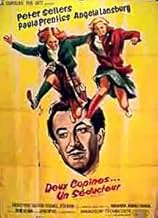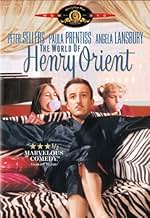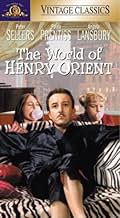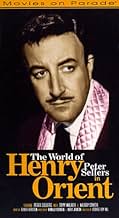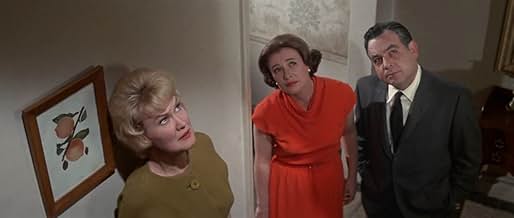Una traviesa y aventurera chica de catorce años y su mejor amiga comienzan a seguir a un excéntrico concertista de piano por la ciudad de Nueva York después de que ella se enamore de él.Una traviesa y aventurera chica de catorce años y su mejor amiga comienzan a seguir a un excéntrico concertista de piano por la ciudad de Nueva York después de que ella se enamore de él.Una traviesa y aventurera chica de catorce años y su mejor amiga comienzan a seguir a un excéntrico concertista de piano por la ciudad de Nueva York después de que ella se enamore de él.
- Dirección
- Guionistas
- Elenco
- Premios
- 1 premio ganado y 3 nominaciones en total
- Doorman
- (as Jerry Jerrett)
Opiniones destacadas
Another pleasure of the film is the way it captures NYC as it was then. Being a devotee of the city, it makes me both happy and sad to see it in its 40-some year old glory. Happy because I can vicariously experience what it was like; sad because it can only be vicarious. I love NYC, it's still a fantastic city---even though Disneyfication has robbed it of so much---but I get a special thrill when I see it like it was in ORIENT.
A lot has changed,yes. Adolescence hasn't, though, and that's why the film continues to resonate. And that's why THE WORLD OF HENRY ORIENT continues to be watched and written about. That's why we care.
Sellers has the title role as Henry Orient, a pianist more interested in practicing his lines than his scales, but the film's focus is on a lonely young Manhattanite named Gil (Merrie Spaeth) and her new pal Val (Elizabeth "Tippy" Walker), two adolescents who decide to make Val's crush on Orient into the secret center of an adventure-filled friendship.
"Henry Orient" is a film of two parts co-existing uneasily at times. Val and Gil's bond occupies the realm of real life, with Walker and Spaeth giving spot-on performances that seem spontaneous and alive to every moment. The best scene in the movie by far, very much in line with the "Can't Buy Me Love" sequence in the same year's "Hard Day's Night," shows the pair running along a city block, "splitzing" over fire hydrants and tryke-riding boys, their eyes alight with joy as they literally rise over their city surroundings. It's a captivating exercise in what scholars would call "pure cinema." If the rest of the film doesn't rise to that level, it never entirely disappoints, either.
Sellers' sequences are weaker. He's actually quite enjoyable to watch, doing one of his best voice performances as a Brooklynite who affects a French-Italian accent to charm the ladies (listen carefully and you will hear his Brooklyn undertone throughout) but he and Paula Prentiss as the married object of his desires seem to be in a completely different movie, playing a broad farce at odds with the real, sometimes gut-wrenching tone of the rest of the film.
This could be a bigger problem but for Elmer Bernstein's lilting yet driving score, featuring one of the most arresting themes I've heard in film, which seems to carry Val and Gil from one delirious moment to the next with complete abandon while allowing room for darker, contemplative passages. Director George Roy Hill had a gift for employing music at the right moment (see "The Sting"), and the score of "Henry Orient" is a secret strength as it skates over the thinner plot elements.
More obviously a strength is the script by Nora and Nunnelly Johnson, which really captures a sense of how young people talk, goofily, quickly and all-at-once, skipping over the stuff that doesn't matter, like when Val and Gil first meet at their ritzy school. Val asks Gil if she likes being there.
Gil tries to be diplomatic: "They say it's the finest girls' school in the country." "I don't, either," says Val.
Or the priceless exchange they have when taking out a cigarette butt they cadged off of Orient's table during a midday stalk. "No filter!" "He's not scared." One wishes the film found more to draw Orient and his youthful admirers together, though the detour into the state of Val's parental relations has merits of its own, especially with Angela Lansbury doing another of her classic nasty-Mommy turns.
While it didn't set the world on fire in 1964 and, like its young stars, slipped off the radar screen too soon after its premiere, "Henry Orient" remains an engaging glimpse at American youth post-Salinger but pre-Beatles. Sidewalk placards still advertise color TV, while a rich girl's idea of rebellious fashion sense involves wearing a plaid skirt with a mink coat. Trends come and go, but feelings of the kind celebrated in "The World Of Henry Orient" live on.
The two young actresses who played the very natural but entirely madcap duo who precipitate most of the plot's ins-'n-outs are completely charming and they are supported by an extraordinarily well-chosen cast of top-notch professionals. Angela Lansbury, never an actress to shrink from the somewhat less savory aspects of a character she's playing, strikes just the right note as a socialite whose maternal instincts are close to non-existent. I do remember wishing that Paula Prentiss had been given more to do, but I suppose getting mistaken for Jayne Mansfield (in one of the film's funnier sequences) wasn't something to be sneezed at. As the film's title character, Peter Sellers wasn't permitted by director George Roy Hill to unbalance the proceedings. And it certainly seems that scenarist Nora Johnson had inherited more than a modicum of her father Nunnally's professional good taste. This one is a treat for all but the dyspeptic and the excessively demanding.
as an adult. The story of two young girls who sweetly stalk a
concert pianist, played with insane panache by Peter Sellars, is
one of the nicest coming-of-age movies of that era. Set in New
York, her is a surprisingly sophisticated and gentle comedy you'll
enjoy over and over again.
Sellars's clueless, womanizing virtuoso never strikes a false
comic note. He's wildly inventive, never more so than in his
scenes with the gorgeous Paula Prentiss as the way-too-nervous
object of his lust. Playing a married woman who is flattered by his
attentions, Prentiss manages to look glamorous and on the verse
of a nervous breakdown all at once. Why this spectacularly gifted
comic actress didn't make it to the top is a mystery to me.
Angela Lansbury's socialite bitch of a mother is another one of her
classic nasty lady roles. Nobody can look down her nose with the
authority of Lansbury. Yes she got found acceptance and respect
on Broadway and on television, but she was a first-rate character
actress on screen too.
Tom Bosley is sympathetic as Tippy Walker's father and Phyllis
Thaxter exudes motherly warmth as Mary Spaeth's divorced Mom.
The Walker and Spaeth should have had futures as screen
actors. Alas, it was not to be. But they are delightful as the young
girls on the verse of womanhood, with a terrific crush on an
undeserving idol.
Nora and Nunnelly Johnson's script (he of course, a Hollywood
legend) wrote a sharp, funny and observant screenplay that is
respectful of teenagers and the adults. George Roy Hill is not a
great director, but when given good material, he rises to the
occasion as he does here. A real gem.
The acting is fine, surprisingly, from all the principles. The pavonine Peter Sellers usually steals every scene he's in. When he's trying to seduce Paula Prentiss his voice has an accent that sounds somewhere between Italian and Slovenian. He throws in Italian clichés but sometimes gets mixed up -- "Garcon! Due martinis, per favore." One of his funniest moments is when he's performing a terrible piano concerto. He's skipped the last two rehearsals so he's a bit lost. At one point he rolls dramatically into the upper registers (while the rest of the orchestra play checkers) and ends on a trill. He glances at the conductor who slowly shakes his head in disgust. The wrong key. Unperturbed Sellers starts the roll over again and looks to the conductor, who shakes his head again. After the third failure to find the right key, the conductor shakes his head and mouths -- very clearly and silently -- "B Flat." Satisfied, Sellers plunges ahead.
Paula Prentiss doesn't have a very large role but she's delicious both in looks and in her performance. She's so nervous, so flattered by the attention of Seller's phony pianist that she gulps and staggers slightly from time to time. When Sellers finally gets her to his apartment and begins to woo her with a paean to her "burnished shoulders" and "twin poems," she wavers while sitting on the couch and caresses her body parts as he lauds them. She never appears less than half gassed.
Angela Lansbury is in her bitchy mode here, along the lines of her mother in "The Manchurian Candidate." She never seems to go wrong, regardless of the part. Her husband, Tom Bosley, is kind of a good-natured schlub. Phyllis Thaxter looks just fine, considering that she first appeared in "Thirty Seconds Over Tokyo" more than twenty years earlier. Her sweetness might be cloying except that it seems ingrained in her real personality.
The most surprising thing in the performances are the two 14-year-old girls, neither of whom went on to a respectable movie career. They're plain charming, both goofy and funny, but smart and perceptive as well. "Gilbert" (Spaeth) comes from a warm middle-class family. We can tell because on Christmas we see them preparing a turkey and having friends over for dinner. Spaeth went on in real life to become a strong George W. Bush supporter and helped torpedo John Kerry with the Swiftboat Ads in 2004, for what it's worth.
"Valerie Campbell Boyd" (Walker) is a neurotic genius from a dysfunctional rich family. (That name is a great WASP cognomen, by the way). They're two cute kids, believe it or not, especially Tippy Walker who brings a molestable element to her role. Hill seems to recognize this and gives the PREverts in the audience a couple of slow-motion upskirt shots as the two jump over fire hydrants and dance on park benches. But it's all pretty unstressed and one would be hard put to think of a better image for two pleasant and happy kids living in a world of fantasy than to have them laughing and leaping in the air. Where do they find kids who can act so well? Walker has a way of flipping her hair back and gawkily hunching her shoulders that spells Preppiness.
The film has its serious moments but most of it is low-key humorous. I saw it in a drive-in in Riverhead, Long Island. You probably won't regret watching it.
¿Sabías que…?
- TriviaThe character of Henry Orient was inspired by real-life concert pianist Oscar Levant. Nora Johnson, who wrote the novel on which the movie was based (and co-wrote the screenplay with her father, Nunnally Johnson), said that she and a friend had a crush on the rather homely Levant when they were schoolgirls.
- ErroresWhen Mrs. Gilbert pours Mr. Boyd a drink at her home, the "scotch" foams slightly. Real booze doesn't do that; its ubiquitous stand-in, cold tea, does.
- Citas
[Val induces a fantasy about Gil's divorced parents]
Val Boyd: Think your Dad will ever come back?
Marian Gilbert: Why can he? He's married and has a couple of kids.
Val Boyd: But how do you know he's happy?
Marian Gilbert: He's crazy about her.
Val Boyd: I know, but just suppose he suddenly realized his second marriage was a tragic mistake. His eyes are opened at last, and he knows now that your mother is the only woman he's ever loved in his whole life.
Marian Gilbert: I don't think there's much chance of that.
Val Boyd: So there's nothing to do but tell her the truth... the scond wife I mean. He's simply got to go back to the only woman he's loved in his whole life. Good-bye, second wife.
Marian Gilbert: You think that's really possible?
Val Boyd: Well, he's got no other choice. He can't go living a lie, can he? He's got to go back to his one true love.
Marian Gilbert: Maybe, during Christmas.
Val Boyd: Chirstmas Eve maybe.
Marian Gilbert: About 6:00.
Val Boyd: You and your mother are all alone trimming the tree, when suddenly the doorbell rings.
Marian Gilbert: I'd be the one to go and answer it.
Val Boyd: But you'd be wondering 'who on earth it could be,' because you weren't expectign anyone. He'd open the door, and he'd be standig there simply loaded with presents. And before you could say anything, he'd say, 'Shhhh,' because he wants to surprise your mother. At first, he'd give you a big hugh, just as tight as he could.
Marian Gilbert: And them Mom would come down wondering who it was, beause she'd be wondering why she didn't hear anybody say anything.
Val Boyd: And for a long time, they'd just stand there and stare at each other not saying anything.
Marian Gilbert: They wouldn't have to.
Val Boyd: [sighing mid-sentence] And then he'd take her in his arms, and rain kisses on her upturned face, and they'd just... love each other to death right there at the front door.
- Créditos curiososintroducing MERRIE SPAETH as "Gil" TIPPY WALKER as "Val"
- ConexionesFeatured in Hollywood: The Gift of Laughter (1982)
- Bandas sonorasHenry Orient Concerto
Music by Ken Lauber (as Kenneth Lauber)
Conducted and orchestrated by Ken Lauber (uncredited)
Selecciones populares
- How long is The World of Henry Orient?Con tecnología de Alexa
Detalles
- Fecha de lanzamiento
- País de origen
- Idiomas
- También se conoce como
- The World of Henry Orient
- Locaciones de filmación
- The Brearly School, 610 E. 83rd Street, Nueva York, Nueva York, Estados Unidos(School bus drop-off at end of opening credits)
- Productora
- Ver más créditos de la compañía en IMDbPro
- Tiempo de ejecución1 hora 46 minutos
- Color
- Relación de aspecto
- 2.35 : 1
Contribuir a esta página




